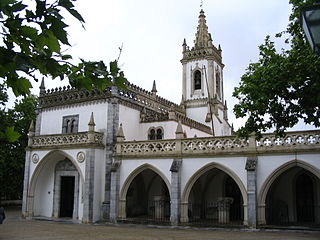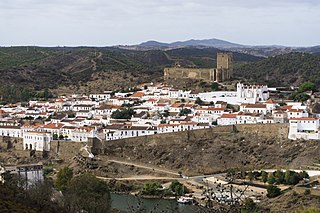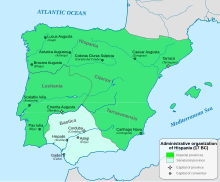
Lusitania was an ancient Iberian Roman province encompassing most of modern-day Portugal and a large portion of western Spain. Romans named the region after the Lusitanians, an Indo-European tribe inhabiting the lands.

Caldas da Rainha is a medium-sized Portuguese city in the Oeste region, in the historical province of Estremadura, and in the district of Leiria. The city serves as the seat of the larger municipality of the same name and of the Comunidade Intermunicipal do Oeste. At the 2011 census, the municipality had a population of 51,729 in an area of 255.69 square kilometres (98.72 sq mi), with 30,343 residing in the city. Although the city itself lies about 10.5 kilometres (6.5 mi) inland, three of the municipality's civil parishes lie on the Atlantic Ocean. Caldas da Rainha is best known for its sulphurous hot springs and ceramic pottery.

Legio X Gemina, was a legion of the Imperial Roman army. It was one of the four legions used by Julius Caesar in 58 BC, for his invasion of Gaul. There are still records of the X Gemina in Vienna in the beginning of the 5th century. The legion symbol was a bull. Early on in its history, the legion was called X Equestris (mounted), because Caesar once used the legionaries as cavalry.

Portugal is a unitary state with delegated authority to three levels of local government that cover the entire country:

Beja is a city and a municipality in the Alentejo region, Portugal. The population in 2011 was 35,854, in an area of 1,146.44 km2 (442.64 sq mi). The city proper had a population of 21,658 in 2001.

The Cynetes or Conii were one of the pre-Roman peoples of the Iberian Peninsula, living in today's Algarve and Lower Alentejo regions of southern Portugal, and the southern part of Badajoz and the northwestern portions of Córdoba and Ciudad Real provinces in Spain before the 6th century BC. According to Justin's epitome, the mythical Gargoris and Habis were their founding kings.

Mértola is a town and municipality in southeastern Portuguese Alentejo near the Spanish border. In 2011, the population was 7,274, in an area of approximately 1,292.87 square kilometres (499.18 sq mi): it is the sixth-largest municipality in Portugal. Meanwhile, it is the second-lowest population centre by density with approximately 5.62 persons/1 square kilometre (0.39 sq mi).
Municipium Cives Romanorum Felicitas Julia Olisipo was the ancient name of modern-day Lisbon while it was part of the Roman Empire.
Dom Heliodoro de Paiva was a Portuguese composer, philosopher, and theologian.
The Battle of Pedroso was fought on 18 February 1071, in Pedroso, near the Cávado river crossing next to Monastery of São Martinho de Tibães, Braga, Portugal.

Balsa was a Roman coastal town in the province of Lusitania, Conventus Pacensis.

The coat of arms of the Municipality of the Hydromineral Spa of Águas de São Pedro is the official coat of arms of Águas de São Pedro.
The territory of modern-day Portugal was Romanized following the events of the Second Punic War, through the Roman conquest of the Iberian Peninsula.

Lacobriga was an ancient town of Celtic origin, usually identified as the predecessor of the current city of Lagos in Portugal. The nearby Archaeological Site of Monte Molião is also known as Lacobriga.

Myrtilis Iulia was the Roman name given to present day Mértola, Portugal. During Classical Antiquity, Mértola was inhabited by Phoenicians, Carthaginians and finally the Romans, who called it Myrtilis Iulia.

This article covers the history of ancient Portugal, the period between Prehistoric Iberia and County of Portugal.
The Arcaheological site of Quinta dos Patudos is an archaeological site in the civil parish of Alpiarça, in the municipality of the same name in the Portuguese district of Santarém. Sometimes referred to as the "castle" of Alpiarça, it is part of an archeological station within the Quinta dos Patudos, that includes the Castle of Alpiarça, Cabeço da Bruxinha, Necropolis of Tanchoal and the Necropolis of Meijão.

The Jew is a 1996 Brazilian-Portuguese co-production film directed by Jom Tob Azulay with Filipe Pinheiro in the title role, Dina Sfat, and Mário Viegas as the king. It tells the story of the writer António José da Silva, nicknamed "the Jew", burned at the stake during the reign of King João V of Portugal in 1739.

Antónia Gertrudes Pusich was a Portuguese poet, dramaturgist, journalist, pianist and composer.
José Carreira Marques was a Portuguese politician.


















